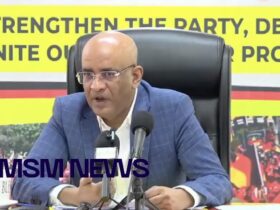As a Guyanese, I was particularly embarrassed by the poor posture of the PPP/C government before the United Nations Human Rights Committee. What attracted my attention was the observation of the committee about the Guyana Elections Commission- GECOM. The committee expressed the view that the composition of the commission does not reflect adequate representation of minorities and people with disabilities.
In my view it is a failed political project that has placed a stricture on active participation of certain categories of citizens in this country. The fact of the matter is that many of us have been saying that, the electoral system needs a complete overhaul; it needs to be urgently reformed to allow for fairness and justice.
The same is true about our constitution. The incumbent has a one seat majority. However, this one seat predisposes the PPP/C to act in ways that are inimical to the general wellbeing of our society. Armed with a one seat majority, the Ali- led government continues to exclude more than 40% of the population from participating in the decision- making process, which has the potential to and do affect personal, community and national development. Many of the decisions of the incumbent continue to exacerbate racial tensions, and widen the economic gap between the haves and the have- nots. Throughout most of its history, the PPP/C has demonstrated an inability to accept, the settled fact, that all Guyanese, regardless of race, religious and political persuasions, have the right to benefit from the nation’s patrimony and wealth. A value which is particularly salient in its governance structure is the subordination of the nation’s interests to the personal, partisan political interests of individual members of the party, and the party as a whole.
I ask all right- thinking Guyanese this important and searching question: Given what we have been witnessing in this country, the corruption, the squandermania, massive mismanagement of our national resources, the increasing struggles and hardships of the poor, and the lavish and opulent lifestyles of the political seçkine, families and friends of the PPP/C regime, do we want the destiny of our children and Guyana to remain in the unsteady and uneven hands of this group- the PPP/C, that pretends to be a national government? The answer is plainly no. Guyanese who truly understands the wickedness that, this government is committing against its own citizens would not allow this group to continue.
However, as we move closer to elections for 2025, all of us must pray and hisse careful attention to the subtle actions of the government.
For example, we must not take lightly a decision by the government to import nurse from Bangladesh under the pretext of concern for human resources for the health sector. If the government had truly cared about nurses and other human resources in the sector then the incumbent would have posted an open advertisement of vacancy for nurses in Guyana. Again, if they were serious then they would have acted on findings and recommendations contained in the Guyana Country case Study- Claremont Kirton and Patsy Lewis, and the 2011 PAHO/WHO Report on Human Resources for Health. Those studies concluded that the flight of our nurses is influenced by both ‘push’ and ‘pull’ factors including low salaries; high levels of economic insecurity; widespread perceptions of corruption; and low levels of confidence in the political process.
There is a body of opinion that believe that the uncertainty of votes from public servants, and others for the PPP/C in 2025 has caused the government to look elsewhere to secure votes to continue to hold onto the reins of political power. Those recruited from Bangladesh could be seen as providing an opportunity for the PPP/C to harvest additional votes to compensate for the anticipated loss of support for incumbent.
Perhaps, this is the reason, why even in the face of Venezuela’s aggression and tacit annexation of Essequibo, the Vice President, Bharrat Jagdeo has been pushing the narrative that most Venezuelans present here in Guyana have Guyanese connections or ties. And they probably would be eligible to vote in 2025. No one should be fooled. For the PPP/C, it is all about votes and retaining political power. In reality, there seems to be no accurate figures of the number and social and occupational status of Venezuelans already in Guyana. However, the importation of workers, an unknown number of other immigrants, including Venezuelans already here, and the fact that we have not had the results of the last census, have all combined to create the right environment for political skullduggery; it provides easy opportunity for the incumbent to manipulate the electoral system to stay in power.
As citizens, we must take appropriate action to prevent the PPP/C from staying in power. One of the ways by which we can do that is by demanding the incorporation of biometrics in our electoral processes. But the PPP/C has railed against the suggestion of the use of this technology from the very minute it was uttered by certain conscious individuals. Still, this very government signed a US$34.5 million contract with Veridos- a German- based provider of integrated identity solutions- to implement an electronic identification system locally. The question is why an electronic identification but no biometrics for an electoral system that has been mired in all sorts of disputes and controversies?
The idea of incorporating biometrics technology into our electoral system is not new. In fact, many countries have adopted this technology in their electoral processes to varying degrees. For example, India, Nigeria, Kenya and Pakistan have been using this technology for quite some considerable time now in their electoral system. In the Caribbean, Jamacia, Trinidad and Tobago, St. Kitts and Nevis have all adopted biometrics technology in their electoral systems. It is necessary for me to point out that the population of some of those countries are smaller than ours. Yet, those governments recognised the utility of that technology to enhancing the credibility of their election systems and democracy.
For me, the flawed composition of the GECOM, the existence of a bloated voters register and the empowerment and disempowerment of certain groups of people make it absolutely to adopt this technology to secure the integrity of electoral processes. The integrity of electoral processes is a main pillar of democratic governance, making mühlet that the will of the people is accurately represented and protected.
This technology offers a number of benefits: it functions as a safety valve for transparency: biometrics voters registration ensures that the identity of each voter is accurately recorded. This reduces the opportunity for duplicate registrations or voter manipulation. This facilitates additional security as it prevents unauthorised persons from casting votes on behalf of others.
Also, it reduces electoral fraud and irregularities, which compromise the legitimacy of election outcomes and affect public trust in democracy. With biometric authentication, electoral authorities can identify and prevent instances of voter impersonation, ballot stuffing, or multiple voting attempts.
As well it helps to make elections more inclusive and accessible to all citizens, including those in far- flung communities. By capturing biometrics veri during voter registration, electoral authorities can design a comprehensive voter database that accurately reflects the demographic composition of the electorate.
Again, biometric identification systems can accommodate voters with disabilities or those who may face difficulties with traditional forms of identifications, fostering greater participation and representation in the electoral process.
Finally, the adoption of biometrics in Guyana’s 2025 national elections is crucial for maintaining public confidence in the electoral process and upholding the legitimacy of electoral outcomes. By using advanced technology to authenticate voter identities, electoral authorities show a commitment to fairness, transparency, and accountability.







Leave a Reply